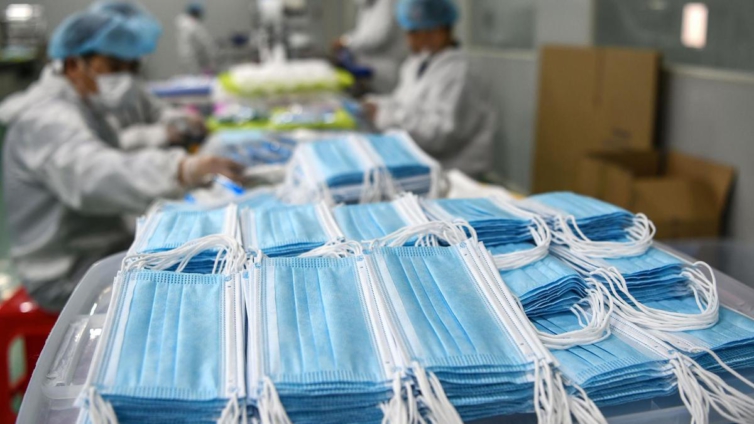Millions of Africans are at risk of contracting Covid-19 due to a lack of the most basic public health tools to protect themselves, including the essentials of soap and water.
These measures, known as non-pharmacological public health interventions (NPIs), and including physical distancing or isolation at home to prevent transmission, are among the simplest and least expensive methods to slow the spread of SARS-CoV-2, the virus that causes Covid-19.
Yet huge numbers of Africa's roughly 1.4 billion people do not have access to these tools, researchers said.
"Hundreds of millions of people across Africa simply lack means for implementing NPIs to prevent SARS-CoV-2 transmission," said Dr Timothy Brewer, UCLA Fielding School of Public Health Professor of Epidemiology and Professor of Medicine, and a member of the Division of Infectious Diseases, at the David Geffen School of Medicine at UCLA.
"These populations urgently need to be prioritized for vaccination to prevent disease and to contain the global pandemic."
The findings, published this month in the peer-reviewed journal Epidemiology & Infection, as "Housing, sanitation and living conditions affecting SARS-CoV-2 prevention interventions in 54 African countries" -are from an international team, led by Brewer and colleagues at the University of Bristol, and including researchers in China, Ethiopia, Mexico, South Africa, Spain, Sweden, the United Kingdom, and the U.S.
As of now, COVID-19, caused by severe acute respiratory syndrome coronavirus 2 (SARS-CoV-2), has resulted in some 7.3 million cases and 185,505 deaths across the continent.
Globally, nearly 210 million cases and 4.4 million deaths have been reported in more than 200 countries, although total mortality due to COVID-19 may be as high as 7 million deaths.
The global COVID-19 case fatality ratio approximates that of the 1918 H1N1 Influenza pandemic.
"SARS-CoV-2 spreads primarily by respiratory droplets generated by coughing, sneezing or talking," Brewer said.
"Until effective vaccines are universally available, NPIs are the principal means by which governments prevent SARS-CoV-2 transmission in their populations."
In addition to isolation of those infected and contact tracing and quarantine for those exposed, the World Health Organization (WHO) recommends physical distancing, masking in public places and hand washing as important NPIs that countries should employ for COVID-19 prevention and control.
Laboratory-based and observational studies suggest that physical distancing and the wearing of face masks may reduce SARS-CoV-2 transmission by at least 80 per cent.
"These findings illustrate the substantial barriers many African households face in keeping safe from SARS-CoV-2 infection because of living conditions that preclude their ability to quarantine, isolate or maintain physical distancing and because of substantial obstacles to handwashing," said Dr Jody Heymann, a UCLA distinguished professor of public health, public policy, and medicine who serves as director of the Fielding School's WORLD Policy Analysis Center (WORLD).
"Crucially, the findings raise the urgency of getting vaccines rapidly to all countries in Africa, which lag far behind, and for addressing the underlying conditions of poverty that place populations at increased risk from respiratory virus outbreaks and pandemics."
Across the 54 countries, approximately 718 million people live in households with more than six individuals at home. Approximately 283 million people live in households where more than three people sleep in a single room. An estimated 890 million Africans lack on-site water, while 700 million lack in-home soap/washing facilities.
"The pandemic has exposed structural inequalities in almost all spheres, from health to the economy, security to social protection," said study co-author Yehualashet Mekonen, director of the African Child Observatory Program at the African Child Policy Forum (ACPF).
"Girls in the continent have particularly felt its impact with far-reaching consequences on their life trajectories including higher risks for early marriage, drop out from school and reduced access to reproductive health services."
The researchers also made the point that despite the structural and resource issues faced by governments in Africa, some nations’ responses to COVID have been among the best in the world.
"Unfortunately, impoverished living conditions mean that it is almost impossible for many people in African countries to follow public health advice and protect themselves from the virus," said co-author Dr David Gordon, with the University of Bristol in the United Kingdom.
"European and North American countries need to stop hoarding millions of doses of vaccines that they will never be able to use and make them available to people in Africa."
Latest Stories
-
Patrick Yaw Boamah urges Black Stars to improve after FIFA ranking drop
3 minutes -
Martin Kpebu calls for commission of enquiry into search at ex-BoG Governor’s home
17 minutes -
Mahama consults Council of State on petitions to remove Chief Justice
29 minutes -
Pepsodent celebrates World Oral Health Day by championing access to dental care
33 minutes -
Ministry of Health unite with stakeholders to fight Tuberculosis on World TB Day
35 minutes -
Patrick Boamah urges Black Stars to improve after FIFA ranking drop
43 minutes -
MP Sampson Ahi commends President Mahama for inspiring Black Stars
49 minutes -
Presbyterian University matriculates 190 law students in Kumasi
1 hour -
Parliament approves GH₵1.28bn for Ministry of Energy and Green Transition
1 hour -
Mahama expresses confidence in new District Assemblies Common Fund administrator
1 hour -
Don’t put GoldBod in hands of people with no work experience – Kyei-Mensah-Bonsu
1 hour -
Name MP who was paid to kill ‘ghost names’ scandal – Ahmed Shaib dares AG
1 hour -
KNUST researchers establish strong link between climate change, food consumption and food security in Ghana
1 hour -
A/R Anti-illegal Mining Taskforce claims to have rid all forest reserves of illegal mining
1 hour -
CSIR-SARI advances to semifinals in Seeding The Future Global Food Challenge with NIR tool to combat aflatoxin in groundnuts
2 hours

